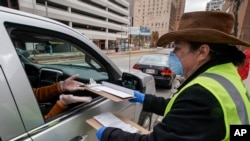The Midwestern U.S. state of Wisconsin is set to hold elections, including a Democratic presidential primary, on Tuesday, with its state officials at odds on how to stop voting during the national coronavirus pandemic.
More than a dozen U.S. states have postponed Democratic presidential primaries in April and May between former Vice President Joe Biden and Vermont Sen. Bernie Sanders until weeks from now in hopes by then that the effects of the virus will have dissipated enough to allow voters to show up at polling places to cast ballots.
But as of Sunday, Wisconsin’s vote is still planned, even if hundreds of polling places throughout the state cannot open for lack of Election Day workers. The workers by the droves have canceled their promise to work at the polls checking in voters from registration lists.
Biden appears to hold an insurmountable lead over Sanders in pledged delegates to the Democratic presidential nominating contest in August and is likely to face Republican President Donald Trump in the November national election. But on Sunday Biden did not directly call for postponement of the Wisconsin election, telling ABC’s “This Week” show, “Whatever the science says, we should do.”
Sanders has called for the election’s postponement.
More than 2,100 confirmed coronavirus cases have been reported in Wisconsin and 56 deaths.
A total of 41 U.S. states are under orders from their governors -- including Democrat Tony Evers in Wisconsin – to stay at home except for essential trips out into the public, but Evers did not include voting as essential in issuing his edict.
However, Evers and his Republican political opponents in the state legislature have been unable to agree on how the election should be postponed and the terms of how it could be held later. Numerous state and city elections are also on Tuesday’s ballot.
Republicans have suggested that Evers did not aggressively push to win votes by postponing until recent days. On Saturday, Evers sought to move the voting to May 19 and convert it entirely to mail-in voting, but the legislature quickly adjourned until Monday without taking any action.
Federal judge William Conley refused to stop the election saying he did not have the power to do so.
“Let’s assume that this is a bad decision from the perspective of public health, and it could be excruciatingly bad,” he said last week. “I don’t think it’s the job of a federal district judge to act as a super health department for the state of Wisconsin.”
Conley has ruled that absentee ballots should be counted if they are received by April 13 because tens of thousands won’t get their forms for absentee voting until after the Tuesday vote. He said that voters who requested ballots deserve to have their votes counted.
On Saturday, however, the state Republican Party and the Republican National Committee asked the U.S. Supreme Court to block absentee ballots from being counted in the days after Tuesday’s election.
On Sunday, the mayors of Milwaukee, the biggest Wisconsin city, and the state capital of Madison and other Wisconsin mayors asked state homeland security officials to make the decision to postpone Tuesday’s election.




